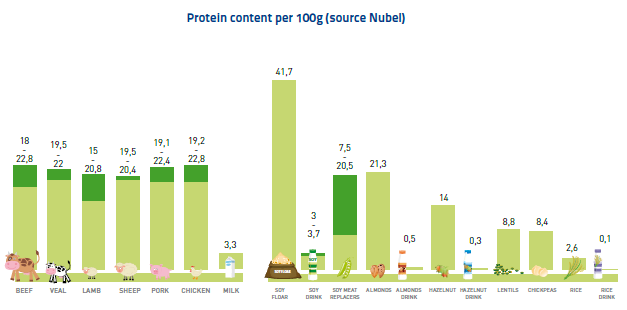Soy foods have an excellent nutritional composition that make them fit well in a healthy and balanced diet.
Not only are soy foods a source of high quality protein, they are also low in saturated fat and contain naturally-occuring isoflavones.
Excellent source of vegetable protein
Soy products are unique since they are source of high quality protein equivalent to meat, dairy and egg protein.

Soy foods provide all essential amino acids in sufficient quantities. These essential amino acids cannot be produced in the body but must be taken in through food.
Consuming soy foods can also help maintain strong and healthy bones. As we age, bone is broken down at a faster rate than new bone is formed. Osteoporosis is a condition where bones become weak and are more likely to fracture. Diet plays an important role in keeping bones healthy and soy foods can help. In 2012, the European Commission – supported by scientific evidence from EFSA, the European Food Safety Authority – approved a health claim in relation to protein and the maintenance of bone health as well as a health claim on calcium and vitamin D. (link EFSA) Since most soy foods (soy drinks, soy desserts, soy alternatives to yoghurt ) are enriched with calcium and vitamin D, they can replace dairy products as part of a healthy balanced diet for maintaining healthy bones
Read the SAC’s position paper on soy and bone health.
Balanced levels of sugar
Soy foods do not contain any lactose, which is the ‘milk sugar’ found in dairy milk. The total level of sugars in soy foods is equivalent or often even lower than the total level of sugars in similar dairy products.
| Nutritional composition (per 100ml) | Energy (kcal) | Protein (g) | Fat (g) | Saturated Fat (g) | Sugars (g) |
|---|---|---|---|---|---|
| Milk | |||||
| Milk, whole | 63 | 3.3 | 3.5 | 2.2 | 5 |
| Milk, semi-skimmed | 46 | 3.3 | 1.6 | 1.0 | 5 |
| Milk, skimmed | 34 | 3.3 | 0.1 | 0.1 | 5 |
| Milk, semi-skimmed, calcium-enriched | 47 | 3.3 | 1.6 | 1.0 | 5 |
| Soya drink | 35 | 3.7 | 2.2 | 0.4 | 0.1 |
High in good fats, low in bad fats
To maintain a healthy body, dietary recommendations include eating plenty of fruit and vegetables, cutting down on salt, keeping an ideal body weight and replacing saturated (‘bad’) fat with unsaturated (‘good’) fat. Soy foods are low in fat, low in saturated fat and contain poly-unsaturated fatty acids (omega 3 and omega 6). Today, the European Commission recognises that food with a low or reduced-content of saturated fats help to maintain normal blood cholesterol levels. To find out more about the benefits of soy or plant-based diets for cardiovascular health, read the SAC position papers.
Natural source of isoflavones
Soy foods contain naturally occurring plant components called isoflavones. Isoflavones have chemically structural similarities to the female hormone oestrogen and are therefore sometimes classified as phytooestrogens. However isoflavones have weak oestrogenic effect in only some tissues and clearly differ from oestrogen. Many studies have investigated the effects of isoflavones on menopausal symptoms such as hot flushes and some have shown a reduction in frequency and or severity. ENSA is closely following scientific developments in this area. Read more about soy and menopause in the SAC’s position paper.
In general, a diet high in plant-based foods such as soy foods, seeds, nuts, legumes (beans, peas, …), whole grains, fruits and vegetables with less animal foods like meat and dairy can help to reduce the saturated fat intake and increase the fibre content of the diet.
Plant-based diets
28 June 2013
Plant-based diets are environmentally friendly Many studies demonstrate that the food we eat has an important impact on our planet and…
European cultivation
28 June 2013
The EU is looking to promote protein plant production in Europe, in order to build self-sufficiency and gradually reduce dependence on…
Soy and the use of scarce natural resources
28 June 2013
The impact of eating habits on the environment The report by the Food and Agriculture Organisation of the United Nations (FAO) entitled,…
Cardiovascular health
28 June 2013
Soy for a healthy cardiovascular system Cardiovascular disease (CVD) affects millions of people throughout Europe every year. It does not…
Lactose intolerance
28 June 2013
Soy and lactose intolerance Lactose intolerance means that the body is unable to - or has difficulty in - digesting lactose or ‘milk…
ENSA’s position paper on the Packaging and Packaging Waste Regulation (PPWR) proposal
31 May 2023
ENSA welcomes the Commission’s Packaging and Packaging Waste Regulation (PPWR) proposal, which aims to revamp the EU packaging legislation…